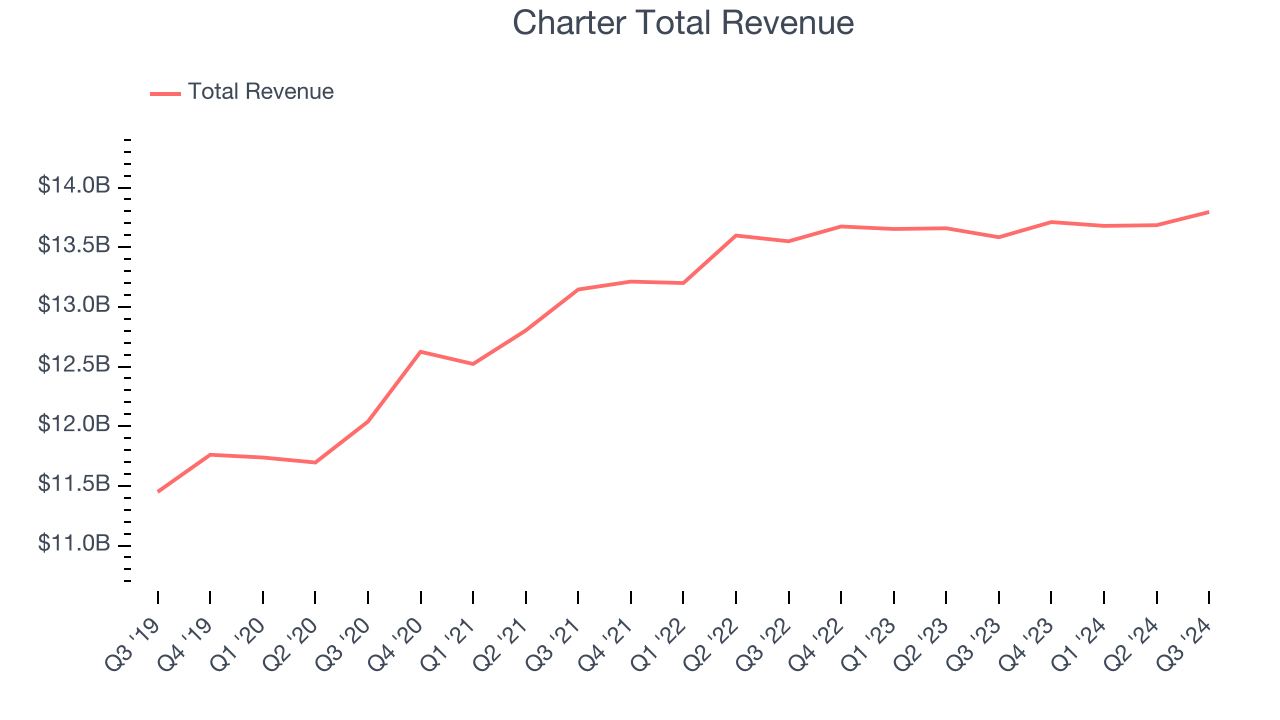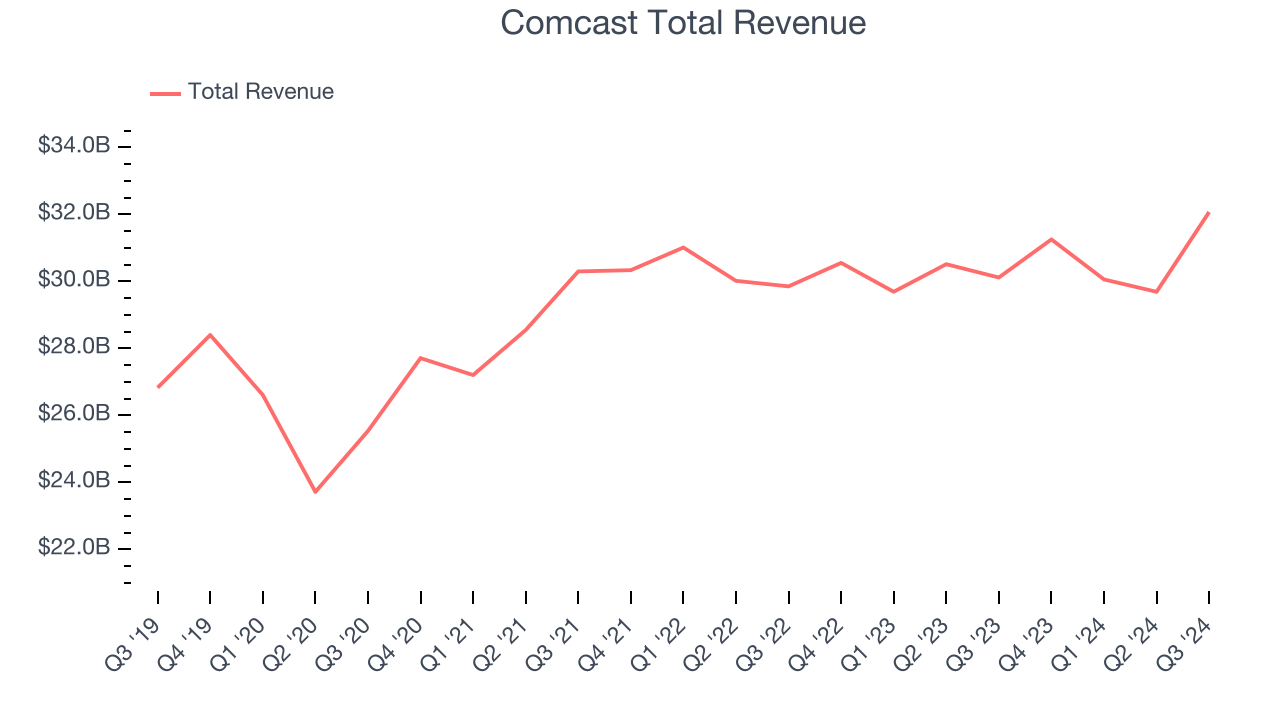
The end of the earnings season is always a good time to take a step back and see who shined (and who not so much). Let’s take a look at how wireless, cable and satellite stocks fared in Q3, starting with Charter (NASDAQ: CHTR).
The massive physical footprints of cell phone towers, fiber in the ground, or satellites in space make it challenging for companies in this industry to adjust to shifting consumer habits. Over the last decade-plus, consumers have ‘cut the cord’ to their landlines and traditional cable subscriptions in favor of wireless communications and streaming video. These trends do mean that more households need cell phone plans and high-speed internet. Companies that successfully serve customers can enjoy high retention rates and pricing power since the options for mobile and internet connectivity in any geography are usually limited.
The 8 wireless, cable and satellite stocks we track reported a slower Q3. As a group, revenues were in line with analysts’ consensus estimates.
In light of this news, share prices of the companies have held steady. On average, they are relatively unchanged since the latest earnings results.
Best Q3: Charter (NASDAQ: CHTR)
Operating as Spectrum, Charter (NASDAQ: CHTR) is a leading telecommunications company offering cable television, high-speed internet, and voice services across the United States.
Charter reported revenues of $13.8 billion, up 1.6% year on year. This print exceeded analysts’ expectations by 1%. Overall, it was a satisfactory quarter for the company with a decent beat of analysts’ adjusted operating income estimates.
"We executed well during the third quarter, building on our operating strategy and foundational investments," said Chris Winfrey, President and CEO of Charter.

Interestingly, the stock is up 15% since reporting and currently trades at $376.81.
Is now the time to buy Charter? Access our full analysis of the earnings results here, it’s free.
Comcast (NASDAQ: CMCSA)
Formerly known as American Cable Systems, Comcast (NASDAQ: CMCSA) is a multinational telecommunications company offering a wide range of services.
Comcast reported revenues of $32.07 billion, up 6.5% year on year, outperforming analysts’ expectations by 1.1%. The business performed better than its peers, but it was unfortunately a mixed quarter with a decent beat of analysts’ EPS estimates but a miss of analysts’ adjusted operating income estimates.

Comcast scored the biggest analyst estimates beat and fastest revenue growth among its peers. Although it had a fine quarter compared to its peers, the market seems unhappy with the results as the stock is down 5.9% since reporting. It currently trades at $39.80.
Is now the time to buy Comcast? Access our full analysis of the earnings results here, it’s free.
Weakest Q3: Sirius XM (NASDAQ: SIRI)
Known for its commercial-free music channels, Sirius XM (NASDAQ: SIRI) is a broadcasting company that provides satellite radio and online radio services across North America.
Sirius XM reported revenues of $2.17 billion, down 4.4% year on year, falling short of analysts’ expectations by 0.8%. It was a slower quarter as it posted a significant miss of analysts’ adjusted operating income and EPS estimates.
Sirius XM delivered the weakest performance against analyst estimates and weakest full-year guidance update in the group. The company reported 39.07 million users, down 2.5% year on year. As expected, the stock is down 6.8% since the results and currently trades at $25.52.
Read our full analysis of Sirius XM’s results here.
AT&T (NYSE: T)
Founded by Alexander Graham Bell, AT&T (NYSE: T) is a multinational telecomm conglomerate providing a range of communications and internet services.
AT&T reported revenues of $30.21 billion, flat year on year. This number lagged analysts' expectations by 0.8%. Zooming out, it was a mixed quarter as it also logged a decent beat of analysts’ EPS estimates but a miss of analysts’ Mobility revenue estimates.
The stock is up 9.2% since reporting and currently trades at $23.48.
Read our full, actionable report on AT&T here, it’s free.
Verizon (NYSE: VZ)
Formed in 1984 as Bell Atlantic after the breakup of Bell System into seven companies, Verizon (NYSE: VZ) is a telecom giant providing a range of communications and internet services.
Verizon reported revenues of $33.33 billion, flat year on year. This print met analysts’ expectations. However, it was a mixed quarter as its performance in some other areas of the business was disappointing.
The company added 277,000 customers to reach a total of 144.7 million. The stock is down 3.9% since reporting and currently trades at $42.10.
Read our full, actionable report on Verizon here, it’s free.
Market Update
Thanks to the Fed's series of rate hikes in 2022 and 2023, inflation has cooled significantly from its post-pandemic highs, drawing closer to the 2% goal. This disinflation has occurred without severely impacting economic growth, suggesting the success of a soft landing. The stock market has thrived in 2024, spurred by recent rate cuts (0.5% in September and 0.25% in November), and a notable surge followed Donald Trump’s presidential election win in November, propelling indices to historic highs. Nonetheless, the outlook for 2025 remains clouded by potential trade policy changes and corporate tax discussions, which could impact business confidence and growth. The path forward holds both optimism and caution as new policies take shape.
Want to invest in winners with rock-solid fundamentals? Check out our Top 5 Quality Compounder Stocks and add them to your watchlist. These companies are poised for growth regardless of the political or macroeconomic climate.
Join Paid Stock Investor Research
Help us make StockStory more helpful to investors like yourself. Join our paid user research session and receive a $50 Amazon gift card for your opinions. Sign up here.




